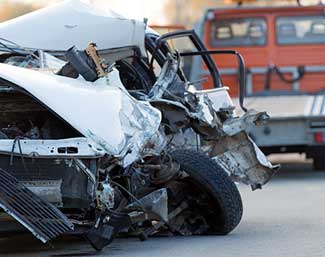
If you’ve been involved in a vehicle accident, figuring out who is to blame may be something you’re concerned about. If you’re pursuing insurance or legal claims, it’s the facts and law that will determine who’s responsible for the crash. You can play your part by providing facts and evidence, but it’s not up to you to decide who should take the blame.
If you have vehicle insurance, you should be able to recover some economic losses and at least some medical coverage from your carrier whether you caused the accident or not. If it’s determined that you were responsible for an accident and another party was injured or suffered property losses, you may be sued, but your insurance carrier should pay for your legal defense, a settlement or jury verdict (up to the policy limits).
There are different kinds of responsibility when it comes to a vehicle accident -- criminal and civil. A violation of criminal law or your state’s vehicle code may have led to the accident. One driver may have been intoxicated, driven recklessly or was speeding. It’s up to local law enforcement to issue a ticket or make an arrest and up to the prosecutor’s office to decide whether or not to pursue criminal charges. On the civil side, if a driver was ticketed, arrested or convicted of a crime, that’s very strong evidence that the driver should be responsible under negligence law for the harm done by the accident.
There are some accidents where responsibility is very clear. You were rear-ended, or your vehicle was legally stopped or parked when it was hit. In many accidents, responsibility isn’t clear, or both drivers may be partially at fault. Both drivers may have been speeding, distracted or fatigued when the accident occurred.
There may be parties to blame beyond the drivers directly involved. One vehicle trying to avoid being struck by a drunk driver may have triggered the accident. A commercial truck driver may have been behind the wheel when a car was struck, but it may have been because his employer hired a company that negligently maintained the truck, resulting in inoperative brakes or dangerously worn tires being used.
You can help determine who’s responsible for the accident by doing your part, assuming you’re not too injured to do so safely and can stay out of traffic.
If the accident is more than a minor fender bender, the vehicles can’t be moved out of the travel lane, or someone is hurt, local police should be contacted. When an officer arrives and starts asking questions ...
The police report is normally the starting point of the investigation into the cause of the accident by the insurance company or a lawyer. Though it’s not treated as gospel truth, and what’s in it can be challenged, the police report carries a lot of weight.
If you’ve been injured in a car accident, after getting medical treatment you should contact an car accident attorney who handles vehicle accident cases as soon as possible. A major reason is so the attorney or his or her staff can start an investigation. If the outcome is that you are entitled to compensation for your injuries, the insurance claim and legal processes can begin.
They should know how to get surveillance camera footage, obtain the police report and go the scene to do their own investigation. With your consent, they can get copies of your medical records to try to match up how the accident happened and how it caused your injuries. Your attorney may hire an expert in the field of accident reconstruction. Once all the facts and evidence are gathered, this person can recreate what happened to determine how and why the accident occurred.
Once all this done, your attorney should have a solid grasp of who’s to blame and, if multiple parties share the blame, have a good idea of who is how much to blame. Whether this is accepted by an insurance company depends on the situation and how reluctant the company may be to pay a legitimate claim to compensate you for your injuries and economic losses. If an insurance carrier is being unreasonable with a settlement, a lawsuit can be filed.
It’s not up to you to decide who’s responsible for your accident, but you have an important role in helping those who make these decisions.
